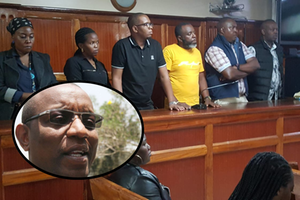
Former Juja MP George Thuo who died after suspected poisoning on November 17, 2013. Six people charged with his murder will know their fate on September 21, 2022 when a judge will determine whether to free them or put them on their defence.
Six people sentenced to 15 years in prison each for the murder of former Juja MP George Thuo have been released on a Sh1 million bond pending the determination of their appeal, which judges said has a high chance of success.
The six led by businessman Paul Wainaina Boiyo alias Sheki , the owner of Thika’s Porkies Garden Club, were jailed in April 2024 by the High Court after being found guilty of murder.
Mr Thuo died after being poisoned with a Cyhalothrin pesticide at the club on the night of November 17, 2013.
Others convicted alongside Boiyo are Christopher Lumbazio Andika alias Lumba, Andrew Karanja Wainaina, Samuel Kuria Ngugi alias Visi, Esther Ndinda Mulinge, and Ruth Watahi Irungu alias Atlanta.
A three-judge bench of the Court of Appeal comprising Justices Jamila Mohammed, Francis Tuiyott, and Pauline Nyamweya released them on condition that each deposits a Sh1 million bond with one surety of a similar amount.
While ruling on their bail application, the judges found that the convicts had a strong case against the High Court’s decision to convict and sentence them for the MP’s death.
They also noted that the Director of Public Prosecutions (DPP) had not opposed the bail application, stating the appeals raise valid, weighty and substantial legal issues, especially since the case was based entirely on circumstantial evidence.
"It is notable that the State has conceded the applications and has submitted that the appeals raise substantial and weighty points of law. We think that therein lies the existence of an exceptional circumstance. Without attempting to determine the appeals we think that there is merit in the arguments by the applicants that they were convicted on four different and distinct sets of facts that were purely circumstantial," said the judges.
The Court of Appeal also observed that although four of the convicts shared a table with Mr Thuo that night, there was no direct evidence that they laced his drink with poison.
“This again may not be consistent with the holding of the trial court that there was a fifth person, the waitress, who had access to the drink by virtue of serving Thuo with the beer. Further, as submitted by counsel for the State, these two versions may not be in tandem with a third version that the sixth applicant (Andrew Karanja Wainaina) bought beer from the counter and handed it directly to Thuo,” said the judges.
“In addition, again as conceded by counsel for the State, there was no evidence that the applicants hatched a common intention, before or during the commission of the alleged crime, to kill Thuo”.
The DPP admitted that the appeal has an overwhelming likelihood of success because the trial court based the conviction on circumstantial evidence, which was founded on mere suspicion rather than proof".
The judges added that, as conceded by the State, there was no evidence of a common intention among the six to kill Thuo before or during the alleged offence.
The DPP acknowledged that the appeal had an overwhelming likelihood of success because the conviction relied on circumstantial evidence, “which was founded on mere suspicion rather than proof.”
According to the DPP, it remained questionable whether the prosecution proved that the accused shared a common intent to poison Thuo’s beer, or whether there was enough evidence to link each of them to the act.
The DPP’s legal team also questioned whether there was proof of a premeditated plan to harm or kill the politician, or evidence that the accused developed a shared intention during the incident.
“The question of whether this was a case of mere strong suspicion and conjecture will be a central legal matter during the appeal,” submitted the DPP.
The convicts' lawyers argued that the conviction and sentence were based on flawed legal reasoning and insufficient evidence to meet the threshold for murder.
They further contended that the trial court’s judgment was riddled with contradictions and hypothetical scenarios on how the poisoning occurred, without settling on one, yet convicted all six.
They pointed out that none of the accused had planned to meet Thuo that day, and the conviction rested on inconsistent theories.
“It is clear that the conviction is unsafe as it is grounded on suspicion. The trial court noted in the impugned judgment that there was no evidence of ill motive while Thuo sat amongst the accused,” said the defence team.
They argued that the evidence failed to prove any direct involvement in the murder.
The appeal will now proceed to a full hearing.





